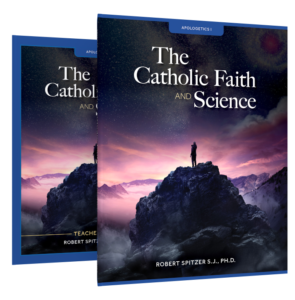Overview
This course explores the scientific evidence for God as well as philosophical proofs of His existence, the historicity of Jesus‘s miracles and Resurrection, the reasons to be Catholic, why an all-loving God would allow suffering, and medical evidence for our transphysical soul. Each chapter includes a study of primary sources from Church history, focus and reflection questions, complete instructions for interactive activities, art, and other visual reflections, Scripture readings, and biographies of Catholic scientists and saints.
Units
The question of God’s existence is intimately and urgently bound up with our own personal destiny. The details of this destiny—that God has called us to live forever with Him in our true home—are things we know because God came to earth in Jesus Christ to tell us. However, there is a lot we can learn about our immortal soul before we take these revelations into account. There is a wide range of natural evidence to look at—from the insights of classical philosophy to the discoveries of modern science. In this unit we will look at some of this evidence. Contemporary science provides many kinds of evidence not just for the human soul, but for the existence of God. In this unit, students explore how all coherent, evidence-based theories of our universe require a definite beginning in the past. This requirement means, as St. Thomas Aquinas demonstrated, that there must be something that transcends physical reality which caused physical reality to move from nothing to something. We call that something a Creator, or God. This unit examines evidence for the existence of God from science as well as philsophy, and explores questions raised by God's existence. We have shown in the last two units that knowledge of God’s existence can be attained through reason. But something more is necessary to know who God is, whether He loves us, and what He wants for us. Now we will spend the and the next unit learning about what God has revealed to us about Himself. In this Unit, students come to underdstand more deeply what it means that God is Love. Jesus brings the revelation of God’s love to its ultimate and unconditional fulfillment by proclaiming the unconditional love of God, by defining love as agapē, and modeling for us loving action in the world. The most detailed illustration of God’s unconditionally loving nature might be found in Jesus’ Parable of the Prodigal Son. The ultimate expression of Jesus’ unconditional love is His self-sacrifice at the end of His earthly mission. Throughout this course we have learned who Jesus is and why we should believe in Him. In this unit, we will understand why we should be Catholic. Students will assess the evidence that Jesus founded the Catholic Church during His earthly life and commissioned St. Peter as the head of His Church, whose successors, the popes, would carry on the authority and leadership of St. Peter for all time. They will also examine how the Church provides ways for us to more deeply live in relationship with God and His community. There are four major kinds of desire: the desire for sensual pleasure, the desire to get ahead over others, the desire to help others, and the desire for the transcendent. When each are satisfied, we feel corresponding levels of happiness. It is important to let the higher levels take a lead role in our lives and keep the lower levels in their proper place, as a means to the end of a fully lived life. In this unit students will explore a final hurdle many face to belief in our unconditionally loving God: the reality of suffering. Everyone suffers in this life. Does this mean God doesn't exist? Or, if He does exist, does suffering mean that He is not powerful enough, or perhaps not caring enough, to stop it? In this unit students will explore three special insights into the meaning of suffering that we gain as Christians, the benefits we can receive from suffering, and advice for what to do when suffering comes.


